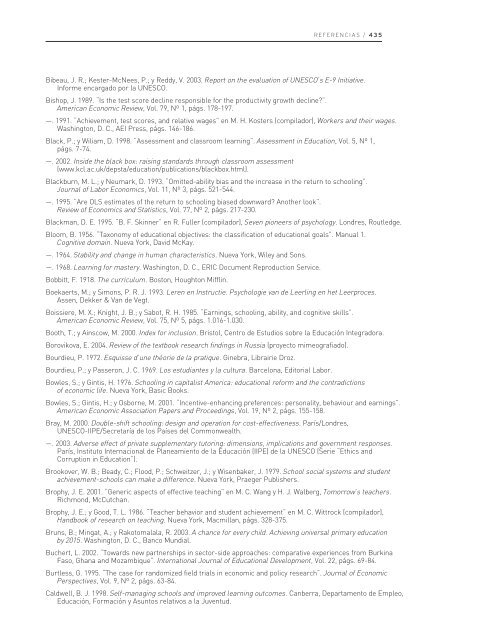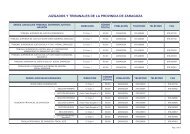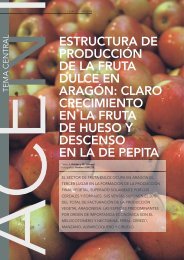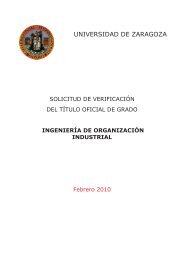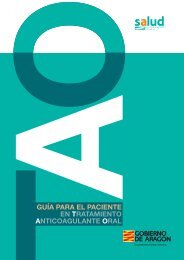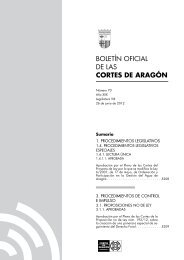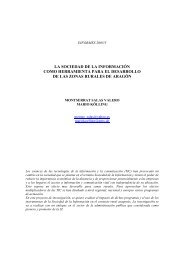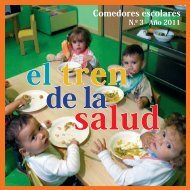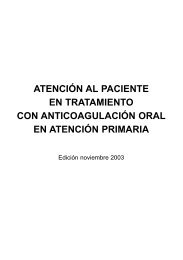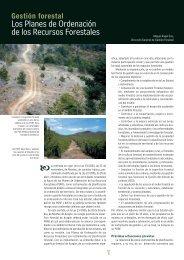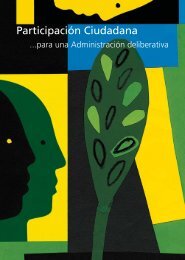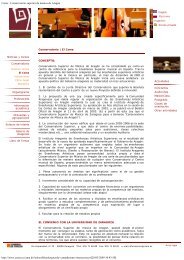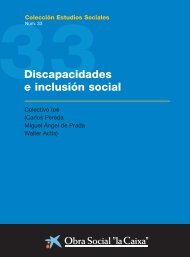Educación para todos: el imperativo de la calidad - unesdoc - Unesco
Educación para todos: el imperativo de la calidad - unesdoc - Unesco
Educación para todos: el imperativo de la calidad - unesdoc - Unesco
You also want an ePaper? Increase the reach of your titles
YUMPU automatically turns print PDFs into web optimized ePapers that Google loves.
REFERENCIAS / 435<br />
Bibeau, J. R.; Kester-McNees, P.; y Reddy, V. 2003. Report on the evaluation of UNESCO’s E-9 Initiative.<br />
Informe encargado por <strong>la</strong> UNESCO.<br />
Bishop, J. 1989. “Is the test score <strong>de</strong>cline responsible for the productivity growth <strong>de</strong>cline”.<br />
American Economic Review, Vol. 79, Nº 1, págs. 178-197.<br />
—. 1991. “Achievement, test scores, and r<strong>el</strong>ative wages” en M. H. Kosters (compi<strong>la</strong>dor), Workers and their wages.<br />
Washington, D. C., AEI Press, págs. 146-186.<br />
B<strong>la</strong>ck, P.; y Wiliam, D. 1998. “Assessment and c<strong>la</strong>ssroom learning”. Assessment in Education, Vol. 5, Nº 1,<br />
págs. 7-74.<br />
—. 2002. Insi<strong>de</strong> the b<strong>la</strong>ck box: raising standards through c<strong>la</strong>ssroom assessment<br />
(www.kcl.ac.uk/<strong>de</strong>psta/education/publications/b<strong>la</strong>ckbox.html).<br />
B<strong>la</strong>ckburn, M. L.; y Neumark, D. 1993. “Omitted-ability bias and the increase in the return to schooling”.<br />
Journal of Labor Economics, Vol. 11, Nº 3, págs. 521-544.<br />
—. 1995. “Are OLS estimates of the return to schooling biased downward Another look”.<br />
Review of Economics and Statistics, Vol. 77, Nº 2, págs. 217-230.<br />
B<strong>la</strong>ckman, D. E. 1995. “B. F. Skinner” en R. Fuller (compi<strong>la</strong>dor), Seven pioneers of psychology. Londres, Routledge.<br />
Bloom, B. 1956. “Taxonomy of educational objectives: the c<strong>la</strong>ssification of educational goals”. Manual 1.<br />
Cognitive domain. Nueva York, David McKay.<br />
—. 1964. Stability and change in human characteristics. Nueva York, Wiley and Sons.<br />
—. 1968. Learning for mastery. Washington, D. C., ERIC Document Reproduction Service.<br />
Bobbitt, F. 1918. The curriculum. Boston, Houghton Mifflin.<br />
Boekaerts, M.; y Simons, P. R. J. 1993. Leren en Instructie. Psychologie van <strong>de</strong> Leerling en het Leerproces.<br />
Assen, Dekker & Van <strong>de</strong> Vegt.<br />
Boissiere, M. X.; Knight, J. B.; y Sabot, R. H. 1985. “Earnings, schooling, ability, and cognitive skills”.<br />
American Economic Review, Vol. 75, Nº 5, págs. 1.016-1.030.<br />
Booth, T.; y Ainscow, M. 2000. In<strong>de</strong>x for inclusion. Bristol, Centro <strong>de</strong> Estudios sobre <strong>la</strong> <strong>Educación</strong> Integradora.<br />
Borovikova, E. 2004. Review of the textbook research findings in Russia (proyecto mimeografiado).<br />
Bourdieu, P. 1972. Esquisse d’une théorie <strong>de</strong> <strong>la</strong> pratique. Ginebra, Librairie Droz.<br />
Bourdieu, P.; y Passeron, J. C. 1969. Los estudiantes y <strong>la</strong> cultura. Barc<strong>el</strong>ona, Editorial Labor.<br />
Bowles, S.; y Gintis, H. 1976. Schooling in capitalist America: educational reform and the contradictions<br />
of economic life. Nueva York, Basic Books.<br />
Bowles, S.; Gintis, H.; y Osborne, M. 2001. “Incentive-enhancing preferences: personality, behaviour and earnings”.<br />
American Economic Association Papers and Proceedings, Vol. 19, Nº 2, págs. 155-158.<br />
Bray, M. 2000. Double-shift schooling: <strong>de</strong>sign and operation for cost-effectiveness. París/Londres,<br />
UNESCO-IIPE/Secretaría <strong>de</strong> los Países d<strong>el</strong> Commonwealth.<br />
—. 2003. Adverse effect of private supplementary tutoring: dimensions, implications and government responses.<br />
París, Instituto Internacional <strong>de</strong> P<strong>la</strong>neamiento <strong>de</strong> <strong>la</strong> <strong>Educación</strong> (IIPE) <strong>de</strong> <strong>la</strong> UNESCO (Serie “Ethics and<br />
Corruption in Education”).<br />
Brookover, W. B.; Beady, C.; Flood, P.; Schweitzer, J.; y Wisenbaker, J. 1979. School social systems and stu<strong>de</strong>nt<br />
achievement-schools can make a difference. Nueva York, Praeger Publishers.<br />
Brophy, J. E. 2001. “Generic aspects of effective teaching” en M. C. Wang y H. J. Walberg, Tomorrow’s teachers.<br />
Richmond, McCutchan.<br />
Brophy, J. E.; y Good, T. L. 1986. “Teacher behavior and stu<strong>de</strong>nt achievement” en M. C. Wittrock (compi<strong>la</strong>dor),<br />
Handbook of research on teaching. Nueva York, Macmil<strong>la</strong>n, págs. 328-375.<br />
Bruns, B.; Mingat, A.; y Rakotoma<strong>la</strong><strong>la</strong>, R. 2003. A chance for every child. Achieving universal primary education<br />
by 2015. Washington, D. C., Banco Mundial.<br />
Buchert, L. 2002. “Towards new partnerships in sector-si<strong>de</strong> approaches: com<strong>para</strong>tive experiences from Burkina<br />
Faso, Ghana and Mozambique”. International Journal of Educational Dev<strong>el</strong>opment, Vol. 22, págs. 69-84.<br />
Burtless, G. 1995. “The case for randomized fi<strong>el</strong>d trials in economic and policy research”. Journal of Economic<br />
Perspectives, Vol. 9, Nº 2, págs. 63-84.<br />
Caldw<strong>el</strong>l, B. J. 1998. S<strong>el</strong>f-managing schools and improved learning outcomes. Canberra, Departamento <strong>de</strong> Empleo,<br />
<strong>Educación</strong>, Formación y Asuntos r<strong>el</strong>ativos a <strong>la</strong> Juventud.


